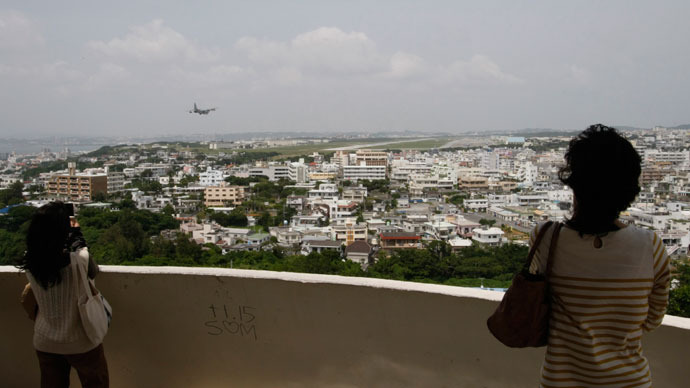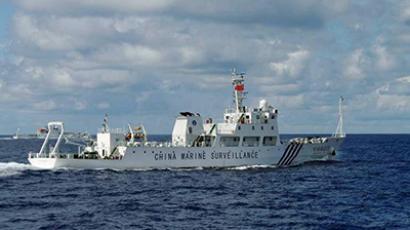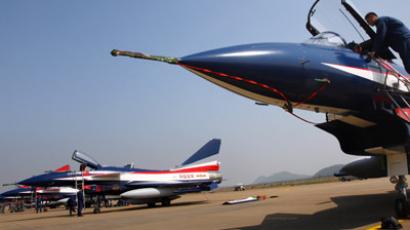Japanese claim on Okinawa challenged in China

China’s leading newspaper has upped the ante in the country’s intensifying territorial dispute with Japan, claiming its high time both sides “re-examine” who has sovereignty over Okinawa – which hosts a massive US military contingent.
The People’s Daily, which serves as the mouthpiece for the
ruling Communist party, ran the lengthy commentary questioning the
historical status of Japan’s southernmost Ryukyu island chain,
which includes Okinawa.
The researchers, hailing from a prominent state-run think tank,
argue ownership of the Ryukyus should be considered in light of
post-World War II declarations which require Japan to return
Chinese territory.
The academics claim the Ryukyus were once a “vassal state of
China” before they were absorbed by Japan in the late 1800s
during the twilight of the Qing Dynasty.
The researchers also reiterated Chinese government claims over a
tiny group of islands in the East China Sea known as the Senkaku in
Japanese and Diaoyu in Chinese.
The islands have been a potential flashpoint between the two states
over the past several months, with Chinese maritime surveillance
vessels sporadically entering Japanese territorial waters following
Tokyo’s decision to effectively nationalize the islets last
September.

The most recent claims regarding Okinawa’s sovereignty are likely meant to pressure Tokyo over the East China Sea dispute, Willy Lam, an expert on Chinese politics at the Chinese University of Hong Kong, told AFP.
"I think this is psychological warfare," he said, adding:
"The major point is to put pressure on Japan so that the Japanese administration will be forced to make concessions over the Senkaku islands." While the daily is often used a barometer on issues both domestic and international for China’s ruling class, the Chinese government has not explicitly endorsed the claims.
When asked about Japanese ownership of Okinawa, Foreign Ministry
spokeswoman Hua Chunying said scholars had long researched the
history of the island chain. However, she was equivocal about the
“Diaoyu islands”, claiming they “are China's inherent territory,
and have never been part of the Ryukyus or Okinawa."
The Japanese government was dismissive of the commentary, saying the views expressed were “completely out of the question.”
“There’s no doubt that [Okinawa] belongs to Japan historically and internationally,” the Wall Street Journal cites Japanese government spokesman Yoshihide Suga as saying.
Okinawa Island, the largest island in the Ryukyu island chain, currently hosts 32 US military bases including Kadena Air Base – the focal point of US airpower in the Pacific – and the longstanding Marine Corps Air Station Futenma.
With up to 85 percent of Okinawans opposing the US military presence and heightened tensions in the East China Sea, Japanese Prime Minister Shinzo Abe on Wednesday said it was time to consider taking the nation’s security into its own hands.
Speaking before the Japanese Parliament, Abe questioned whether
Japan should always have to ask the United States to “attack
someone who is threatening to attack us,” before calling on a
debate on whether Japan should form its own force which would be
modelled on the US Marines, Bloomberg News reports.
Abe has previously vowed to “expel by force” any Chinese
landing on the Senkaku Islands.
China ‘flexes its muscles’
James Corbett, the editor of a Japan-based news website, told RT
that the statements were mostly political posturing and bravado on
the part of the Chinese.
“It is, at the very least, an interesting new development and
obviously meant to increase pressure on Japan over the disputed
Senkaku Islands,” Corbett told RT. He stressed that the move
needed to be looked at from the broader perspective of China
“flexing its diplomatic muscles.”
“We see it [China] venturing into other types of diplomatic
forays,” Corbett said, referring to Israeli Prime Minister
Benjamin Netanyahu’s official visit to China and Beijing’s
statements regarding a Chinese-brokered Israeli-Palestinian peace
plan.
On the other hand, Corbett drew attention to the fact that China
was reinforcing its military presence in the region with the
deployment of new technologies at “incredible” expense.
He also noted that Japan was going to have to take a “spectator
role” while China builds up its military presence, because they
do not have the resources to compete with the Chinese.
“It’s just a question over whether this will actually spill over
into a military conflict,” Corbett told RT, adding that with
the ascension of Shinzo Abe to the post of Prime Minister, there
was once again a push to change the Japanese constitution to make
it possible for Tokyo to deploy military force.














